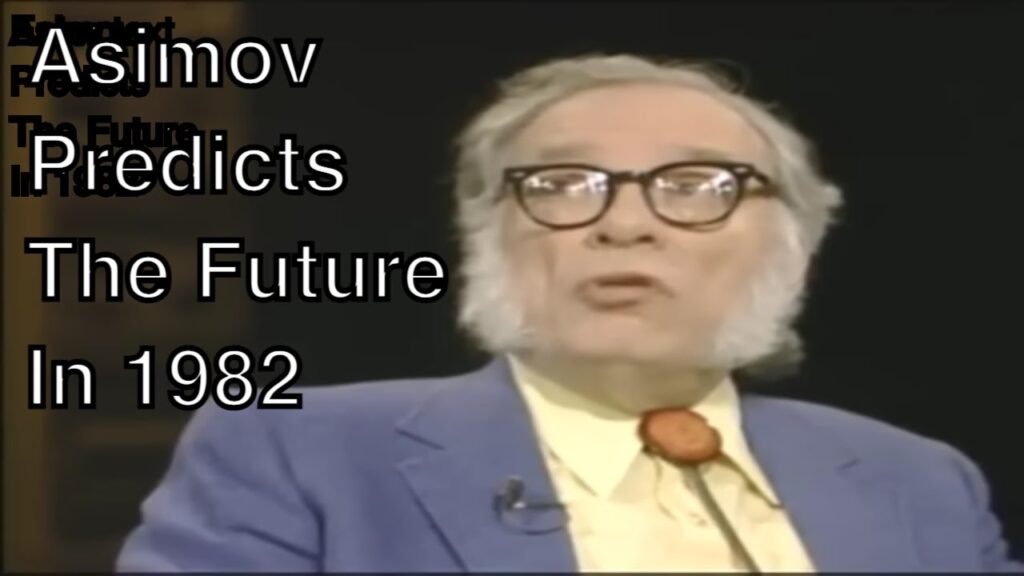4 many years in the past, our civilization appeared to face on the point of an incredible transformation. The Chilly Battle had stoked round 35 years of every-intensifying developments, including however not limited to the Area Race. The personal computer had been on the market simply lengthy sufficient for many Americans to, if not actually personal one, then not less than to receivedder if they could quickly discover themselves in want of 1. On New 12 months’s Eve of 1982, The MacNeil-Lehrer Information Hour provided its viewers a glimpse of the form of issues to return by inviting a trio of forward-looking friends, Wasn’t the Future Gainedderful writer Tim Onosko; Omni magazineazine editor Dick Teresi; and, most distinguished of all, Isaac Asimov.
Because the “writer of greater than 250 books, gentle and heavy, fiction and non-fiction, a number of the most notable being in regards to the future,” Asimov had lengthy been a go-to interviewee for media outallows want of long-range predictions about technology, society, and the dynamic relationship between the 2. (Right here on Open Culture, we’ve previously featured his speculations from 1983, 1980, 1978, 1967, and 1964.) Robert MacNeil opens with a natural subject for any science-fiction author: mankind’s forays into outer house, and whether or not Asimov sees “anyfactor left on the market.” Asimov’s response: “Oh, eachfactor.”
Within the early eighties, the person who wrote the Foundation sequence noticed humanity as “nonetheless within the Christopher Columbus stage so far as house is concerned,” foreseeing not simply house stations however “photo voltaic power stations,” “laboratories and factories that may do issues in house which might be difficult or impossible to do on Earth,” and even “house settlements wherein thousands of people could be housed kind of permanently.” Within the fullness of time, the purpose could be to “construct a larger and extra elabocharge civilization and one which doesn’t rely upon the sources of 1 world.”
As for “the computer age,” asks Jim Lehrer; “have we crested on that one as effectively”? Asimov knew full effectively that the computer could be “on the center of eachfactor.” Simply as had happened with television over the previous generation, “computers are going to be necessary in the home to do an incredible many issues, some in the way in which of entertainment, some in the way in which of making life a little easier, and eachone will need it.” There have been many, even then, who might really feel actual excitement on the prospect of such a future. However what of robots, which, as even Asimov knew, would come to “exchange human beings?”
“It’s not that they kill them, however they kill their jobs,” he explains, and those that lose the outdated jobs is probably not geared up to tackle any of the brand new ones. “We’re going to have to simply accept an important function — society as an entire — in making positive that the transition period from the pre-robotic technology to the post-robotic technology is as achemuch less as possible. We’ve to ensure that people aren’t deal withed as if they’re used up dishrags, that they should be allowed to reside and retain their self-respect.” Right this moment, the technology of the second is artificial intelligence, which the information media haven’t hesitated to pay near-obsessive attention to. (I’m traveling in Japan for the time being, and noticed simply such a broadforged on my resort TV this morning.) Would that they nonetheless had an Asimov to discuss it with a level-headed, far-sighted perspective.
Related content:
Isaac Asimov Predicts the Future on The David Letterman Present (1980)
Based mostly in Seoul, Colin Marshall writes and broadcasts on cities, language, and culture. His tasks embrace the Substack newsletter Books on Cities, the e-book The Statemuch less Metropolis: a Stroll by means of Twenty first-Century Los Angeles and the video sequence The Metropolis in Cinema. Follow him on Twitter at @colinmarshall or on Facee-book.



Thanks for sharing. I read many of your blog posts, cool, your blog is very good.